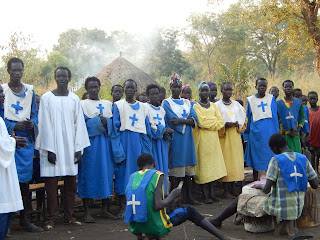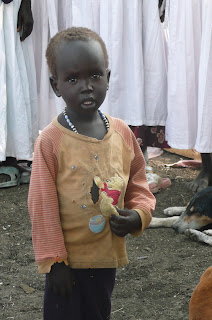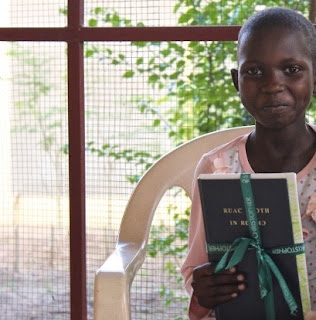~ Waking up to the sounds of a successful ‘hockey tournament’ played in our attic by the bats who had moved in during our absence in June. (Of note – moth balls do not deter bats, but they seem to have lots of fun sending them skimming over the ‘floor’ of the attic).
~ Cooking breakfast, lunch and supper for eight (I am learning that ‘Company’ is just family – the wider family of a life shared with One who has many brothers and sisters!).
~ Tending neighborhood children as well as the staff and their family members for a variety of interesting things: large oozing tropical ulcers, wounds, infections of various sorts, HIV and malaria.
~ A few precious moments spent planning out the drama that is to accompany my next Mothers’ Union teaching story – this one on prevention and treatment of malaria and scabies; “Helping Each Other when Little Things cause Big Problems”.
~ Spending time with someone dear:
 |
| Cham Ojur Puro |
This afternoon I visited with Cham who was at home in mourning, grieving from the sudden loss of her mother to malaria. Her mother was “very very very old – probably 55 or 60”. I felt so privileged to sit with a circle of friends in Cham’s house, the conversation ranging from family to neighbors to bemoaning the electricity (or lack thereof) here in Gambella. Exposed wires, usually tied together with torn plastic bags, had, in Cham’s house, the luxury of electric tape patching them together. Two women in the community were recently electrocuted when the wires running along the roof of their houses were blown down by the wind. As our visit wound to a close, we were honored with a serving of Pepsi – a real treat, although one that I personally tend to find palatably challenging! We ended with a prayers and hugs. I felt very rich.
A typical few days for Grant in Gambella
Thursday, July 23rd:
It’s rainy season. We gather for morning prayer around
8am, our Gambella Anglican Centre staff together with the 20 or so prospective theological students attending our advanced English class. So instead of the usual mix of languages, we are worshiping mostly in English. Today’s meditation (Matthew chapter 6) is led by Darash. “What do salt and light do, and so what should we do to be salt and light to our communities?” , he asks. After prayer, and (impossibly sweet) tea, we had a staff “work day”. We’re trying to turn our compound into the garden of Eden, so we need to take advantage of rainy season to plant and arrange vegetation. No sooner had tomatoes and cucumbers and flowers been planted than the deluge began – thunder, lightening. Within an hour our rain water tanks were filled to overflowing. The rain and the accompanying sound and light show continued all day. Ample amounts of laughter seemed to be coming from the English class – always a good sign. Steve, our visiting professor from America, together with his helper Ken, a Canadian theological student, had to yell in order to be heard over the pounding rain crashing on to the classroom’s tin roof. The workers building the chapel had a good couple of hours work before being defeated by the rain. They have been busy erecting arches – the walls will soon be up, the floors and vestry finished, and then the roof.
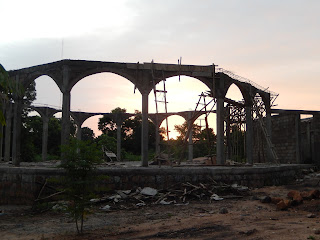 |
St Frumentius College Chapel / Multi-purpose Building – under construction!
|
In our ongoing battle with whatever has decided to move into our attic, I threw a batch of moth balls through the trap door. If the moth balls don’t work, my next offensive will be with incense. Apparently unwanted critters around here – be they mice, bats, or whatever, don’t like incense – must be low church mice, bats, whatever…
Friday
The rain has eased back today. Every plant in the place has grown an inch or two overnight.
Before I went to Egypt last week I heard about food shortages once again cropping up in the Gambella People’s Region. More and more refugees keep coming. This morning I wrote a letter to a few friendly organizations that have helped us in the past. Hopefully some help will come. Our ‘Samaritan Fund’ for emergencies was running low.
At 3pm I had a meeting with four of our five Regional Deans (I managed to get information from the fifth before the meeting, so everyone was represented). We talked about some potential pastoral moves, a few problems (including the fact that a thousand people from an ethnic group where we’ve never had a church suddenly want to become Anglicans). We also divided up the money we have for emergencies and money we had for building churches (now that fund is empty too).
At 5pm I met with a church council that wants an electric keyboard. It’s an extremely ‘cool’ item whose blasting tinny rhythms are guaranteed to to attract the young people, apparently. They don’t have the money to pay for it, so they want the bishop to help. The bishop also doesn’t have the money, but that is hard for them to believe. They also know that the bishop, for some reason, doesn’t seem to be delighted at the idea of purchasing this highly desirable item. Anyway after an hour and a half or so I managed to convince them that they needed a plan to raise the money and that if they had a good plan I would help them somehow. Sigh.I hate saying ‘no.’ I have to say it almost every day, though.
Saturday:
Today Wendy and I took our guests to some of the ‘tourist hotspots’ in Gambella, including – the prison. The prisoners there make and sell bead work, so while Wendy helped Ken and Steve to choose something for their families, I sat and chatted with one of the inmates – a former Anglican pastor I had to depose for robbing the church. After leaving us he got another job, but stole money there as well – hence the prison sentence. I’ve visited and prayed with him a few times now. He is sad to be in prison, but insists that he is innocent, so I can’t really say he’s repentant. Still, God is not finished with him.
Sunday:
This morning’s adventure (most Sunday mornings are an adventure) took us to a new church in a village called Koat Ngoal; don’t ask me to pronounce it. Two hours of driving takes us to Lare. From there we drive off road for ten minutes or so until that is no longer possible.
 |
The Road to Koat Ngoal
|
Soon we reach a group of Mothers Union members singing a welcome song. This usually means we’ve arrived. Not today. Today it means, “Here’s where you need to follow us into the elephant grass and maize fields.” A half hour walk in the mud through grass 8-9 feet high finally brings us to the church.
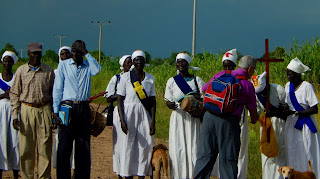 |
Mothers’ Union meet us on the road
|
The congregation in Koat Ngnoal is not new, but they have recently build a church and so instead of being under a tree, they have a place with shade from the sun and shelter from the rain. The welcome at the church is a typical Nuer welcome (finally something typical!) with enthusiastic singing, ululations, hand shaking and footwashing for the guests. The church itself is a tiny stick, mud and thatch structure – somehow we manage to squeeze 40-50 people in. The lessons point to Jesus as the Good Shepherd, so when it comes time to give the church a name (names are only given to the church when the bishop comes), it is easy – Good Shepherd Anglican Church. After the service lunch is provided for us back in Lare (with a literal ‘song and dance’ welcome from the Sunday School) – then the two hour drive back to Gambella town.
 |
We reach Good Shepherd Anglican Church, Koat Ngoal
|
Showers. Naps. No rain today – but lots of thunder and lightening as I write at
6pm. It will certainly rain tonight. More adventures tomorrow.
~ Please Pray with us ~
~ for God’s blessing upon the opening of St Frumentius Anglican Theological College, Gambella
~ for our incoming theological students
~ for our faculty Jeremiah Maet Paul, Karen Salmon, Dr Johann Vanderbijl as well as those providing teaching in intensive courses including Tekele Belachew and Bishop Grant
~ for those visiting teams who will be teaching the students and clergy on Healing from Trauma
~ for God’’s provision for funding for the remaining classrooms and faculty housing as well as the completion of the St Frumentius College Chapel / multipurpose building
~ for discernment for those seeking ordination as deacon and priest, and for the selection committee advising the bishop
~ with thanksgiving for our recent wonderful visitors: Rev Kim Beard and the Toronto team; Steve Hunt; Ken Johnstone
 |
One of our ‘typically’ beautiful backyard birds:
a Pygmy Kingfisher
|
FOG on the BLOG
A few months ago a friend in Toronto (the Rev Dean Mercer) emailed with an idea. He wanted a way for Canadians to support our work in Ethiopia and suggested the formation of FOG (Friends Of Grant). Joining is easy – the membership fee is $100 a year sent to DevXchange (their website address is at the bottom of this page). The money can be sent electronically or by cheque. DevXchange will send a charitable receipt. There are not many benefits to being a member (the satisfaction of giving and the receipt being about it…). Some have objected to the name (“What about Wendy?”). Dean’s answer was that lots f stuff rhymes with FOG – we can have a BOG when we’re in town (a Big Old Meeting); we ca talk about FOG on our BLOG (as I am doing right now!); However, for those concerned about this (Wendy says she isn’t concerned), you could chose to call yourself a FOGWART, since Friends Of Grant and Wendy Are Really Terrific. This group is of course welcome to all – but especially those who wish to receive a CANADIAN charitable receipt. Those who aren’t concerned about the Canadian part can still give through DevXchange – or the other organizations which are helping us, like FADE, FACE and SAMS.
Blessings,
“A Friend”
|






